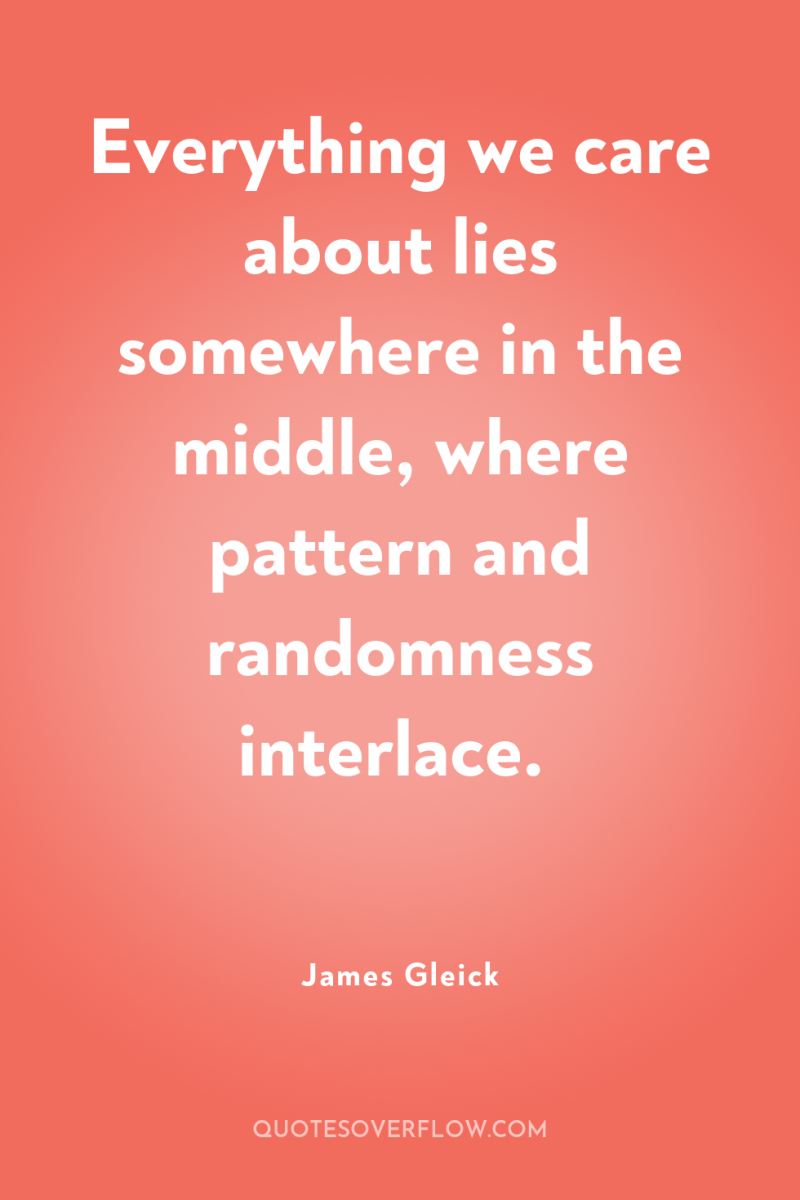
1
Everything we care about lies somewhere in the middle, where pattern and randomness interlace.James Gleick
2
It’s not an academic question any more to ask what’s going to happen to a cloud. People very much want to know–and that means there’s money available for it. That problem is very much within the realm of physics and it’s a problem very much of the same caliber. You’re looking at something complicated, and the present way of solving it is to try to look at as many points as you can, enough stuff to say where the cloud is, where the warm air is, what its velocity is, and so forth. Then you stick it into the biggest machine you can afford and you try to get an estimate of what it’s going to do next. But this is not very realistic.James Gleick

3
Vengeful conquerors burn books as if the enemy's souls reside there, too.James Gleick
4
The library remains a sacred place for secular folk ["What Libraries Can (Still) Do, " The New York Review Daily, October 26, 2015].James Gleick
5
The library is the last free space for the gathering and sharing of knowledge: “Our attention cannot be bought and sold in a library.” As a tradition barely a century and a half old in the United States, it gives physical form to the principle that public access to knowledge is the foundation of democracy ["What Libraries Can (Still) Do, " The New York Review Daily, October 26, 2015].James Gleick
6
There are two kinds of geniuses: the 'ordinary' and the 'magicians'. An ordinary genius is a fellow whom you and I would be just as good as, if we were only many times better. There is no mystery as to how his mind works. Once we understand what they've done, we feel certain that we, too, could have done it. It is different with the magicians. Even after we understand what they have done it is completely dark. Richard Feynman is a magician of the highest calibre. -- Mark Kac .James Gleick
7
You don’t see something until you have the right metaphor to let you perceive itJames Gleick
8
Of all the possible pathways of disorder, nature favors just a few.James Gleick
9
Billions of years ago there were just blobs of protoplasm; now billions of years later here we are. So information has been created and stored in our structure. In the development of one person’s mind from childhood, information is clearly not just accumulated but also generated–created from connections that were not there beforeJames Gleick
10
The brain does not own any direct copies of stuff in the world. There is no library of forms and ideas against which to compare the images of perception. Information is stored in a plastic way, allowing fantastic juxtapositions and leaps of imagination. Some chaos exists out there, and the brain seems to have more flexibility than classical physics in finding the order in it.James Gleick
11
Simple shapes are inhuman. They fail to resonate with the way nature organizes itself or with the way human perception sees the world.James Gleick
12
It struck me as an operational way to define free will, in a way that allowed you to reconcile free will with determinism. The system is deterministic, but you can’t say what it’s going to do next.James Gleick
13
In a way, art is a theory about the way the world looks to human beings. It’s abundantly obvious that one doesn’t know the world around us in detailJames Gleick
14
The only things that can ever be universal, in a sense, are scaling things.James Gleick
15
The pattern appears so ethereally, that it is hard to remember that the shape is an attractor. It is not just any trajectory of a dynamical system. It is the trajectory toward which all other trajectories converge.James Gleick
16
The early sense of self-similarity as an organizing principle came from the limitations on the human experience of scale.James Gleick
17
The boundary is where points are slowest to escape the pull of the set. It is as if they are balanced between competing attractors, one at zero and the other, in effect, ringing the set at a distance of infinity.James Gleick
18
IN THE MIND’S EYE, a fractal is a way of seeing infinity.James Gleick
19
One simple but powerful consequence of the fractal geometry of surfaces is that surfaces in contact do not touch everywhere. The bumpiness at all scales prevents that. Even in rock under enormous pressure, at some sufficiently small scale it becomes clear that gaps remain, allowing fluid to flow.James Gleick
20
The fractal structure nature has devised works so efficiently that, in most tissue, no cell is ever more than three or four cells away from a blood vessel. Yet the vessels and blood take up little space, no more than about five percent of the body.James Gleick
21
The pits and tangles are more than blemishes distorting the classic shapes of Euclidian geometry. They are often the keys to the essence of a thingJames Gleick
22
Self-similarity is symmetry across scale. It implies recursion, pattern inside of pattern.James Gleick
23
Ideas that require people to reorganize their picture of the world provoke hostility.James Gleick
24
We all behave like Maxwell’s demon. Organisms organize. In everyday experience lies the reason sober physicists across two centuries kept this cartoon fantasy alive. We sort the mail, build sand castles, solve jigsaw puzzles, separate wheat from chaff, rearrange chess pieces, collect stamps, alphabetize books, create symmetry, compose sonnets and sonatas, and put our rooms in order, and all this we do requires no great energy, as long as we can apply intelligence. We propagate structure (not just we humans but we who are alive). We disturb the tendency toward equilibrium. It would be absurd to attempt a thermodynamic accounting for such processes, but it is not absurd to say we are reducing entropy, piece by piece. Bit by bit. The original demon, discerning one molecules at a time, distinguishing fast from slow, and operating his little gateway, is sometimes described as “superintelligent, ” but compared to a real organism it is an idiot savant. Not only do living things lessen the disorder in their environments; they are in themselves, their skeletons and their flesh, vesicles and membranes, shells and carapaces, leaves and blossoms, circulatory systems and metabolic pathways - miracles of pattern and structure. It sometimes seems as if curbing entropy is our quixotic purpose in the universe.James Gleick
25
We have met the Devil of Information Overload and his impish underlings, the computer virus, the busy signal, the dead link, and the PowerPoint presentation.James Gleick
26
The bit is a fundamental particle of a different sort: not just tiny but abstract–a binary digit, a flip-flop, a yes-or-no. It is insubstantial, yet as scientists have finally come to understand information, they wonder whether it may be primary: more fundamental than matter itself. They suggest that the bit is the irreducible kernel and that information forms the very core of existence.James Gleick
27
Thinking about language, while thinking _in_ language, leads to puzzles and paradoxes.James Gleick
28
Strangely enough, the linking of computers has taken place democratically, even anarchically. Its rules and habits are emerging in the open light, rather shall behind the closed doors of security agencies or corporate operations centers.James Gleick
29
Despite the metadata attached to each tweet, and despite trails of retweets and 'favorite' tweets, the Twitter corpus lacks the latticework of hyperlinks that makes Google's algorithms so potent. Twitter's famous hashtags - #sandyhook or #fiscalcliff or #girls - are the crudest sort of signposts, not much help for smart searching.James Gleick
30
Information is not knowledge, and knowledge is not wisdom. Reading - even browsing - an old book can yield sustenance denied by a database search. Patience is a virtue, gluttony a sin.James Gleick
31
We have a habit of turning to scientists when we want factual answers and artists when we want entertainment, but where are the facts about the nature of the self? Neurologists peering at PET scans and f M R Is know they aren't seeing the soul in there.James Gleick
32
It's important with any new technology to try to pay conscious attention to what the drawbacks might be. We choose to multitask. Sometimes our choices aren't the wisest of choices, and we regret them, but they are our choices. I think it'd be wrong to think that they're automatically bad.James Gleick
33
Every time a new technology comes along, we feel we're about to break through to a place where we will not be able to recover. The advent of broadcast radio confused people. It delighted people, of course, but it also changed the world.James Gleick